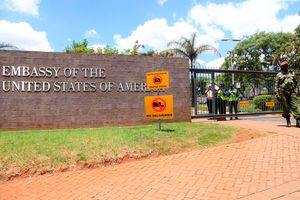
Tanzania President Samia Suluhu Hassan.
Once admired as an “abode of peace” or “house of peace” (“Dar es Salaam” in Arabic), Tanzania now cuts the unsightly image of a wellspring of oppression.
The country’s fifth president, John Pombe Magufuli (2015–2021), unleashed oppression on a national scale. Now, his successor, President Samia Suluhu Hassan (65), is giving wings to repression on a regional scale across the entire East African Community (EAC) bloc.
On May 19, 2025, Tanzania’s tyranny reared its ugly head in Kenya when Suluhu blocked Martha Karua and other colleagues from entering Tanzania. The East Africa Law Society (EALS) had invited Karua, one of East Africa’s topmost female leaders and the Party Leader of People’s Liberation Party (PLP), to observe the treason trial of Tanzania’s opposition leader, Tundu Lissu. “We’ve seen activists from other countries (read Kenya) trying to interfere with our nation,” Samia said on May 19, 2025, adding that: “Our country remains the only peaceful and secure nation in the region.”
East Africa is gripped in a battle of ideas, which is increasingly taking on a distinct gender tilt. Suluhu represents one of the two competing visions of power shaping governance in the region. One vision, represented by Tanzania’s first female president, is “absolute hegemony.” This idea implies a situation where one entity or group wields complete and unchallenged power, controlling all aspects of life in a country or region in ways that undermine freedom, justice and human rights. The other vision, represented by Martha Karua, is “democratic consensus.” This form of governance emphasises inclusivity, deliberation, and compromise to realise freedom, equality and justice.
Moreover, Suluhu also wants us to believe that Karua and other East Africans are enemies of peace and security. In the run-up to the general elections on October 28, 2025, Tanzania is facing a serious bout of oppression. Suluhu, nominated as the presidential candidate of the ruling Chama Cha Mapinduzi (CCM) party in January 2025, is determined to win the elections and return to power through hook or crook. She is a heiress to Magufuli, described as “the bulldozer” because of his uncompromising and hardline tactics.
Magufuli ushered in a repressive personality cult. He derailed Tanzania from the rule of law, normalised political violence, banned opposition parties, and turned the country into a de facto one-party state. His government used violence, draconian restrictions, electoral manipulation and bias to win the 2020 legislative elections, which opposition parties boycotted. Inadvertently, this boycott enfeebled the opposition. In 2017, the leader of the opposition, Tundu Lissu, was riddled with 17 bullets, but survived the assassination attempt.
The current Tanzanian regime has also waged war on digital and civic spaces. Surveillance has increased, critics are frequently trolled or harassed online, and independent voices in civil society have been intimidated into silence. International organisations have raised red flags about shrinking civic space and the use of cyber laws to criminalise dissent. Tanzania’s youth, once seen as a vanguard for reform, are now targeted for merely expressing divergent opinions on social media.
Last year, Samia took a dramatic U-turn. What has rattled her was the growing influence of the opposition. The Magufuli-era tactics of abduction, intimidation, and killings of CCM critics returned. In August 2024, Suluhu ordered the arrest of 500 Chadema supporters who were planning to attend an International Youth Day rally. She arrested three leaders of Chadema: Chairman Freeman Mbowe, Vice Chairman Tundu Lissu, and Secretary General John Manyika. In September 2024, Ali Mohamed Kibao, a member of Chadema’s secretariat, was abducted, tortured, physically abused, burned with acid on his face and killed. Samia quickly condemned the act, but his killers are free. The Tanganyika Law Society unveiled a list of 83 Tanzanians who had been abducted or disappeared. In November 2024, thousands of opposition candidates were disqualified during local elections. When three online news platforms printed cartoons critical of her, Samia suspended them for 30 days. Ahead of the 2025 elections, electoral reforms have stalled and the INEC is effectively under CCM’s control.
Beyond its borders, Tanzania is regionalising this culture of oppression. Against the law, letter and spirit of the East African Community, Tanzania is blocking regional lawyers from entering the country. This week, Suluhu’s regime detained and tortured the Kenyan activist Boniface Mwangi and his Ugandan compatriot, Agather Atuhaire.
In an interesting twist, Suluhu’s move to regionalise repression in the EAC bloc is boomeranging on Tanzania’s union with Zanzibar. As a Zanzibari herself, Samia is increasingly being viewed as an outsider in CCM and part of Zanzibar’s privileged elite. As the 2024 do-or-die elections loom, she is facing serious internal challenges and supremacy wars with Magufuli-era CCM hardliners. Her strategy is not to expunge the Magufuli camp militants in CCM, but to use them to raise her profile and win her first-ever election.
The facts don’t lie. Tanzania is not an “island of peace” but a classic tin-pot dictatorship. The country’s 2025 election is a moment to forge a new consensus away from Magufuli’s draconian legacy. She should embark on genuine democratic platforms to enhance CCM’s domestic legitimacy to genuinely become Tanzania’s first democratically elected female president.
Prof Peter Kagwanja is former Government Adviser and Currently Chief Executive at the Africa Policy Institute










